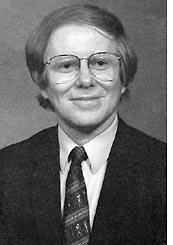
Academy of Applied Science
SPARKS:2002
PLEASE MEET: Michael Judd

Born in Enfield, a London suburb, and educated in London, Australia and the U.S., Michael Judd has a rich and varied background. His wife Elizabeth shares his interest in museums and is involved with museum collection work.
SPARKS: What is the mission of the Lemelson Center at the Smithsonian?
Michael Judd: Since the Lemelson Center was created in 1995, its mission has been to study invention, to archive papers about invention, to educate young people by providing programs that will influence their future and to influence them to consider fields in invention, science or a related field.
SPARKS: How did you become interested in this field?
Michael Judd: Through teaching at high schools in Kansas City, Missouri--world history, geography and American history. I went back to graduate school and received my degree in museum science from George Washington University. Then came the opportunity to work with the Lemelson Center.
SPARKS: Knowing the mission of the Lemelson Center and understanding the goals of the Academy's Young Inventors' ProgramTM (YIP), describe the mutual benefits of this partnership.
Michael Judd: One of the things that has happened over the years is the two-way sharing experience. We've been able to showcase the marvelous people and materials of YIP's programs. In addition, we have inventors who have been useful and helpful to us in our educational mission, and they have also been able to contribute to the Academy's programs.
SPARKS: Parents are the most influential role model a child can have and many students involved in upper levels of science and math have the benefit of parental support, directly or indirectly. How can we reach those students for whom parental and/or socio-economic support is lacking?
Michael Judd: We're going to have to use a combination of things, such as after-school programs, community centers and working with youngsters in unusual and innovative ways to get them working with us. There are a number of programs that kids are involved in after school or helping out in museums across the country. These things spark their interest. We find with our research that a lot of kids who have gotten turned on to science report that it was a teacher, a visit to a museum or some kind of collection they started themselves that lit that first spark. The more we can make those sorts of opportunities available to youngsters, the better the results.
SPARKS: The link between innovation and critical thinking is paramount. Is there something about today's lifestyle that detracts from
critical thinking skills?
Michael Judd: There's a lot of passivity in young people's development these days. Today's adults grew up in a time when playing in a pond or climbing a tree were natural things for kids to do. Today our kids spend a lot of time with video games and, in general, they are pursuing passive activities that take a toll on critical thinking.
SPARKS: National security is often seen by the general public as a purely military function, but isn't our nation's security, and that of the military, largely dependent upon the innovation and technology arising from the private sector?
Michael Judd: Yes, that is very true. Our society has to be well balanced and it has to have strong young people and schools, as well as a strong military. I don't think you can have weakness on one side and expect to have a really viable society. The Lemelson Center stresses the importance of not only getting to know invention but also thinking about how invention has influenced our past. Our founder, Jerry Lemelson, was adamant that our future was linked to our ability to invent things, to our ability to be able to patent things properly and to our ability to train our young people to think creatively. That's key here. As far as defense goes, we must think about the quality of the citizens we are raising as well as their defense.
?
?
?
?
?
?
?